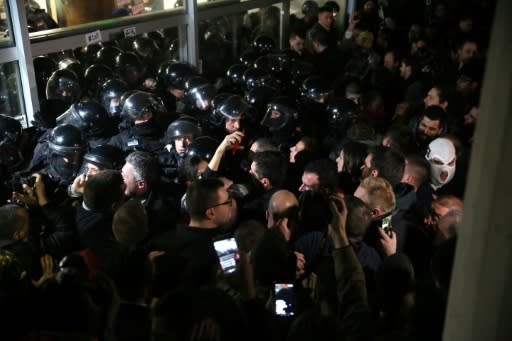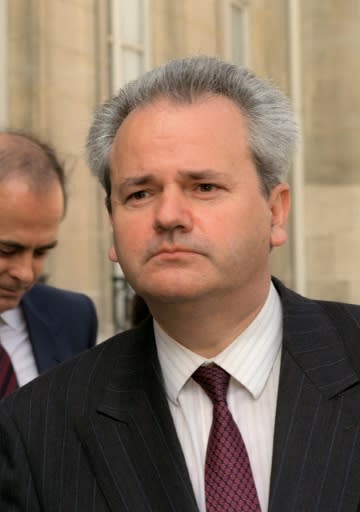Media attacks in Balkans harming EU accession hopes
Last weekend Serbian protesters stormed their state-run TV station demanding fair coverage while Montenegrins were chucking rolls of toilet paper at theirs, as public anger at the media erupts in the Balkan states. From violent attacks on journalists to political and economic pressure on critical outlets, the squeezing of press freedoms in Montenegro and Serbia has been a key rallying cry of the weekly anti-government demonstrations held in the neighbouring countries. And it is an issue that could spell trouble for both their EU accession dreams. In order to reach their goal of joining the European bloc by 2025, Serbia and Montenegro must meet a raft of demands from Brussels, including the key condition of fostering a free and safe media climate. But so far, progress on that front has been minimal or even backwards in two countries where journalists have reason to fear for their safety. In December Serbian journalist Milan Jovanovic, who investigates corruption, had to flee his burning house outside Belgrade as it was reduced to ashes. Several suspects were arrested over the arson attack but quickly released on bail or with a fine. Across the border in neighbouring Montenegro, crime and corruption reporter Olivera Lakic was shot in the leg outside of her home in Podgorica in May, her second physical assault in a decade. No arrests were made until last month, two days before a visit from EU enlargement commissioner Johannes Hahn, who had previously said Montenegro's accession bid would be "hampered" if it did not improve media freedoms. - Unsolved cases - Those are just two assaults out of scores targeting reporters in the Balkan states in recent years. Most cases have never been solved. In Serbia the "media situation is the worst it's been since 1998", during the era of strongman Slobodan Milosevic, according to Ivan Protic who works for a local human rights watchdog. Last year seven journalists were physically attacked in Serbia and nearly 100 other media staff were threatened or put under pressure, according to the Independent Association of Journalists. Reporters Without Borders dropped Serbia 10 spots in its 2018 Press Freedom index, down to 76 out of 189 countries. The watchdog cited an "alarming number of attacks on journalists" as well as "collusion between politicians and media". It placed Montenegro, where "journalists are harassed and threatened by the country?s rulers," even further behind at number 103. Protesters in both countries place the blame on their domineering presidents, two men who have surfed the region's political turbulence in recent decades and restyled themselves as pro-EU leaders. While the presidents publicly hail the importance of press freedom, they also verbally attack journalists from the podium. Serbian President Aleksandar Vucic, who was information minister under Milosevic, routinely targets reporters in his near-daily public addresses, accusing some of working for foreign governments or the CIA. Under "Vucic, Serbia has become a country where it is unsafe to be a journalist," RSF's assessment said. His Montenegro counterpart Milo Djukanovic, who has led the country almost continuously since 1991, also lashes out at critical media. Before the 2018 presidential election he accused the Vijesti media group of promoting "fascist ideas" and wanting to "overthrow power at any cost". - Journalists 'like clay pigeons' - The ruling parties are also accused of silencing critics through more indirect means. In both countries, protesters accuse the presidents of turning public media into propaganda machines. In Belgrade on Saturday, clashes broke out when protesters broke into the state-run RTS TV building and demanded air-time, leading to arrests. RSF condemned the forceful intrusion but also criticised RTS for its "very one-sided coverage of the protests from the outset". Meanwhile in Podgorica, Montenegrin protesters have also targeted their public broadcaster RTCG in rallies, after authorities drew criticism last year for appointing ruling party supporters to key positions at the outlet. In its 2018 report, the European Commission highlighted that instance of "political interference" as a "matter of serious concern". Meanwhile, journalists go about their jobs "like clay pigeons' with targets on their heads, while criminals are unpunished and move freely," lamented Montenegrin reporter Tufik Softic. Softic, who has investigated drug trafficking, knows the dangers firsthand. In 2007 he was beaten up in front of his house. Six years later an explosive was planted in his yard. Serbian riot police clash with protesters at the state-run TV headquarters in Belgrade last Saturday US First lady Melania Trump presents Montenegrin corruption reporter Olivera Lakic with the International Women of Courage Award in Washington earlier this month The media situation in Serbia is the worst its been since the bad old days of strongman Slobodan Milosevic, seen here, according to human rights activist Ivan Protic




